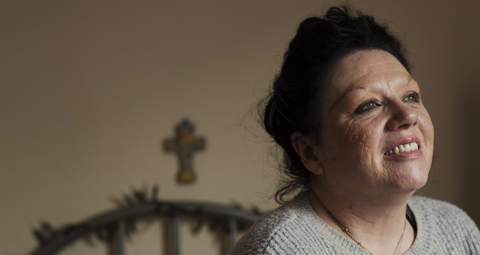January 19 | ![]() 0 COMMENTS
0 COMMENTS ![]() print
print

Fairstart for the homeless: the Catholic charity providing refuge and hope
A project run by Glasgow’s Mungo Foundation is helping vulnerable women get back on their feet, DANI GARAVELLI finds
On the day I meet Jacqueline McKinlay, she has just had five of her teeth extracted. For years, the rotten stumps bore testament to her fractured life. Yellowing and split, they were damaged by acts of violence—a fact she illustrates by miming an upper cut to her own jaw—but also by neglect, prescribed medication and heroin. Though their absence makes it more difficult for her to speak, she is glad to see the back of them; their removal is tangible evidence of a brand new start.
Ms McKinlay (above) hasn’t always been on society’s fringes; despite intense mental health problems, including bipolar disorder and multiple personality disorder, she held down a job in occupational therapy until she turned 40, when she suffered a catastrophic breakdown, which left her almost catatonic. From there, her problems spiralled, until she ended up addicted, drifting and estranged from her husband and two daughters.
By the time she moved into Fairstart—a supported housing project for homeless women in the east of Glasgow—in early autumn, she had been trying, with limited success, to kick her habit. Now, after just a few months there, she is making remarkable progress.
Not only has she moved on to methadone, but she is being allowed to spend time with her 15-month-old grandson, something that would, until recently, have been unthinkable.
“When my older daughter was pregnant, she didn’t want anything to do with me,” she said. “I was to have no contact with the baby. But I have been visiting him for a while now, and, in the last month, I have looked after him for a couple of hours while she is at work. He is wonderful.”
One of many projects run by the Mungo Foundation, a provider of social care for vulnerable people, Fairstart caters for women with complex needs who have become trapped in a cycle of homelessness. Most will have experienced multiple trauma and poor mental health, but they can’t seek treatment until they have stopped using drugs and alcohol, and they find it impossible to stop using drugs and alcohol while still suffering the effects of their trauma.
Although their exact circumstances vary, many will have spent time sleeping rough and in temporary accommodation such as B&Bs or Women’s Aid refuges. Spells in jail are also common, with prisoners often released into areas where drugs are rife, which exacerbates their existing problems.
At Fairstart, the women are given their own self-contained flat—two bedrooms, a bathroom, a kitchen and a sitting room—but the complex is staffed 24 hours a day, so there is always someone available for a chat.
“A lot of women will come down at night because they are getting flash-backs of their past and they can’t cope,” team leader Sinead Osliff said. “They will be sweating profusely because they have had the most awful nightmare, but the staff will speak to them and make them a cup of tea and then they will be calmed and they will go back to bed and try to sleep.”
This is important because such moments of terror are potential flashpoints for relapses.
“When it’s quiet and people are left with their own thoughts—that’s a time they may be tempted to take things to dampen their feelings,” Rosemary White, regional manager of the Mungo Foundation, said. “The fact they come down to speak to staff shows they are starting to recognise the triggers.”
Fairstart, which consists of five flats, is almost always oversubscribed. Women will stay for up to a year before—it is hoped—progressing to an independent tenancy. When a resident moves on, their flat is given a fresh lick of paint before a new woman, referred by the commissioner, arrives to take her place.
Because the women are vulnerable—and mostly fighting addictions—they are not encouraged to socialise in each other’s flats, but they all mix in the general area where they take part in group therapy and arts and crafts and attend social events such as bingo nights.
Fairstart provides customised, wrap-around support, so the women will have access to addiction workers, psychiatrists or anger management classes as required. But they are also taught ordinary life skills such as budgeting and hygiene.
Recently the project won a grant from the Women’s Fund for Scotland which will cover the cost of cookery classes and allow the residents to grow their own vegetables in a small garden out the back.
Upstairs, Ms McKinlay, now 55, takes us on a guided tour of her flat, which she keeps pristine. On her sitting room wall is a canvas with the words, ‘Nothing is impossible if you believe in yourself.’ Other aphorisms are scattered throughout the building.
Reliving the last 15 years has proved distressing for her; she sobbed bitterly while talking about the way her mind closed down at 40 and about her separation from her family.
Some of her story is difficult to follow; understandably given the violence she has been subjected to and the severity of her mental health problems, some of the details of her abuse are nebulous and the chronology confused.
But there is no doubting the reality of her trauma—the ebbing away of her sense of self-worth as she went from owning her own home to sleeping in her car and the degradation of hawking her possessions to buy drugs.
She was most upset describing her close relationship with a fellow drug addict, who is now dead; the pair of them lived together for a while, but when her friend defaulted on a drugs debt and then did a runner, Ms McKinlay was the one who was held hostage and forced to pay up.
This seems to have marked a turning point: soon after, she turned up at her older daughter’s door, begging to be allowed in, and began the long journey back to some kind of stability.
Now, as she leads me into her spare bedroom, her tears have vanished and she exudes an inner radiance. In one corner lie all the goodies she has been stockpiling for Christmas. There are myriad decorations and—in a giant Santa bag—a Lightning McQueen car and other toys.
Later, she opens a kitchen drawer to reveal a festive tablecloth and doilies. On Christmas Day, she will be joined by her father, her two daughters and their partners and her grandson. They will all bring a dish and eat together.
Ms McKinlay says she could feel the warmth at Fairstart the first time she visited; she was desperate to be given a place and elated when the phone call came to say she had been accepted.
“It is like a family—I have never felt so wanted, needed, rewarded,” Ms McKinlay said. “I feel so safe, so secure, knowing there is always someone downstairs. Only when I came here did I start to sleep again. I am going from strength to strength.”
There is much for Ms McKinlay to look forward to in 2018, too. The highlight will be a family holiday in Spain in the summer. Thrilled to have been asked, she is using the date as the deadline for coming off methadone. “I was at 85g a day and am now down to 65g,” she said. “I have a new drugs addiction worker—and she is marvellous.
“She said she would keep me on 65g over Christmas because there is not as much support but in January I will go down to 50g and by July the doctor has written in my notes I will be completely off.”
Of course, not everyone at Fairstart makes as steady progress as Ms McKinlay. For others, the journey will be more stop-start and full of setbacks. It is not unusual for one of the women to be in crisis. A relapse will not automatically see the resident involved lose her tenancy; ideally the staff will work with her to help her get back on track. But a balance has to be struck between supporting the individual and protecting the others in the project.
Still, when things are going well, it is a rewarding job. “There is one woman here, and it’s been like a Mexican wave for her. She will be doing really well, and then she’ll have a relapse and the guilt she feels is terrible,” Ms Osliff Said. “She is doing well just now, partly because Jacqueline, who is so focused on her recovery, is having a good influence.
“Yesterday, this woman went out for the first time in ages. She went to the retail park and she came back with underwear and shoes that should have been £65, but she got them for £16. She had to show us everything. She was so proud and so she should have been. She said: ‘I spent my money on this’—a bra that cost £2—‘and I didn’t spend it on drink.’ That was a joy to witness.
“The therapist was in last night. She was absolutely blown away because months ago the woman looked terrible and now her hair is shining.”
A few weeks after this visit, Ms McKinlay agrees to have her photograph taken for the piece; her Christmas tree is up, her sitting room is festooned with tinsel and she is delighted because her new dentures have been fitted.
“I never thought I would feel happiness again,” she said. “I didn’t know what it meant to be happy. As long as everybody else was alright, I just went on. But I feel fantastic now. I am happy to wake up in the morning and find myself alive.”
Then, she smiles broadly, flashing her straight white teeth at the camera.











